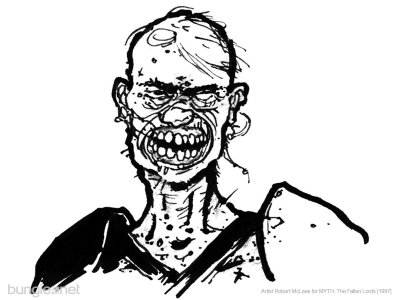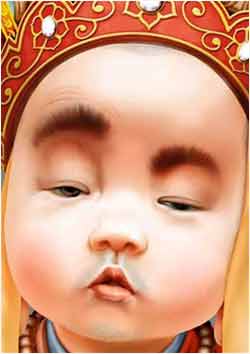Thursday, August 31, 2006
Tuesday, August 29, 2006
A Surprise & Jeff Chang's Love Songs
身边很多老同学变情侣,最后结婚的,简直就是一对一对的挨个数啊,孩子都冒出来很多个。看来还是同学自然的好,情人还是老的好,ha,土办法的征婚广告和现在的什么online matching算来算去搞来搞去实际搞不出个虾米名堂。看到这些新人们,或者旧人们的新闻故事,心里挺高兴,与其说满足了或多或少的花边新闻欲,倒不如说我是真心地祝他们幸福美满,白头到老。
同样,情歌似乎也是老的好也越来越显得是一条真理,感情真挚,表达婉转,旋律悠长。年轻人随着年岁的增长都会生活得越来越累,慢慢变得麻木,难以感动,但抽空冒着喊破嗓子的危险录了几首阿哲的老情歌,却也自己感动了自己一把,找到了一点十几年前“有两种事做不到:听张信哲的歌不流泪,看周星驰的电影不发笑”的感觉:
1。信仰 Download -> Lyric ->
相对比较低一点啦,所有的歌都没有降调,否则唱出来肯定不好听。他的歌,最好都是戴上耳机,夜深人静的时候听。。
2。最伤心是谁(粤) Download -> Lyric ->
流行的不一定好听,不流行的不一定难听,尤其是传唱度低的粤语歌。
3。我是真的 Download -> Lyric ->
有些key没出来,难啊。。。
4。爱不留 Download -> Lyric ->
嗓子已经开始破了。。。
5。下次吧,饶了我,虽然本人的脑袋基本上是一个90年代流行歌曲数据库,听过的歌基本通吃,很少有不会哼的,但也不是什么歌都可以唱得来滴,像《宽容》、《直觉》、甚至《太想爱你》之流,死去个十遍八遍的也许有可能。。。

Saturday, August 26, 2006
Tuesday, August 22, 2006
The Return of the Condor Heroes
 周末“废寝忘食”一口气看完了06央视41集《神雕侠侣》,虽然本人并不是很喜欢武侠的东西,对央视武侠剧一向的感觉也是重景轻人,重武轻文,剧本台词包括配音粗糙生硬,对演员的要求也只是讲靓不讲神。只是偶尔碰到一个高速下载,画质不错,拿来试试我的新硬盘而已。不很喜欢武侠的原因,一个,因为它本身和现代生活甚至古代生活都隔得太远,非得抛开加速度的现代生活节奏去融入武侠的文化世界里才有可能去理解其中人物匪夷所思的各种行为;二个,若仅从文学角度讲,你说是它是神话吧,它又不是菩萨神仙妖魔鬼怪,能将现实的概念“无厘头”地神化,说它是是写实吧,却又根本沾不到边,顶多只是借助一些特定的历史人物来装点一下,不会涉及很有探讨价值的社会和历史问题,所以它就夹在中间,不免让人感到似乎武侠生来就是仅供娱乐消遣,用摸不着边的武功招式和毒药解药博君一笑,亦或是让一段有情人始终无法成眷属的生死恋博君一哭,再深一点也许就是寄托一下人们对中国传统文化的“仁义礼智信”的信奉和对纯洁无瑕的爱情的理想了。
周末“废寝忘食”一口气看完了06央视41集《神雕侠侣》,虽然本人并不是很喜欢武侠的东西,对央视武侠剧一向的感觉也是重景轻人,重武轻文,剧本台词包括配音粗糙生硬,对演员的要求也只是讲靓不讲神。只是偶尔碰到一个高速下载,画质不错,拿来试试我的新硬盘而已。不很喜欢武侠的原因,一个,因为它本身和现代生活甚至古代生活都隔得太远,非得抛开加速度的现代生活节奏去融入武侠的文化世界里才有可能去理解其中人物匪夷所思的各种行为;二个,若仅从文学角度讲,你说是它是神话吧,它又不是菩萨神仙妖魔鬼怪,能将现实的概念“无厘头”地神化,说它是是写实吧,却又根本沾不到边,顶多只是借助一些特定的历史人物来装点一下,不会涉及很有探讨价值的社会和历史问题,所以它就夹在中间,不免让人感到似乎武侠生来就是仅供娱乐消遣,用摸不着边的武功招式和毒药解药博君一笑,亦或是让一段有情人始终无法成眷属的生死恋博君一哭,再深一点也许就是寄托一下人们对中国传统文化的“仁义礼智信”的信奉和对纯洁无瑕的爱情的理想了。95古李版神雕断断续续似乎记得点点,但无法想出来和黄刘版的做一个比较。83刘德华版似乎也太遥远了。83港版射雕是本人的武侠启蒙篇,至今倒是仍念念不忘,是提到经典不得不去想的。除却布景有限,演员的演绎和音乐配乐再怎么比较个人感觉实在有难出其右者,其中特别喜欢郭靖和洪七公,还有让人又恨又怜的杨康。
说归说,贴归贴,既然看完了,怎么也该宣扬一下中国武侠里积极一点的东西,至少copy一下English剧情,让看过之后不至于太快忘掉:
The Return of the Condor Heroes
The Return of the Condor Heroes (Traditional Chinese: 神鵰俠侶; Simplified Chinese: 神雕侠侣; pinyin: shén diāo xiá lǚ) is a classic wuxia novel by Jinyong, first published on May 20, 1959 in the first issue of Ming Pao and ran for about three years. This is the second novel of the Condor Trilogy. The story revolves around Yang Guo the son of Yang Kang and his lover Xiaolongnü in their struggle of finding their own destiny in an unfamiliar world.
Chapters
Jinyong revised the novel in 1970 and again in 2004. There are 40 chapters in the 2nd and 3rd revisions of the novel. Each chapter has a 4-character title. Most of the revisions are either clarifications or minor alterations of character motivations. These are the titles for 3rd revision, slightly different from 2nd revision of the novel.
風月無情 — No Love Under the Wind and the Moon
故人之子 — A Friend's Son
投師終南 — Seeking Tutelage at Mount Zhongnan
全真門下 — Under the Teaching of Quanzhen Sect
活死人墓 — The Tomb of Living Dead
玉女心經 — Heart-Manual of the Jade Maiden
重陽遺刻 — Chongyang's Markings
白衣少女 — White Clothed Girl
百計避敵 — A Hundred Ideas to Avoid Enemy
少年英俠 — The Young Hero
風塵睏頓 — A Pause from Roaming
英雄大宴 — The Heroes' Feast
武林盟主 — The Chancellor of Martial Clans Wulin
禮教大防 — Defending against Custom and Tradition
東邪門人 — The Disciples of Eastern Heretic
殺父深仇 — Avenging a Father's Death
絕情幽谷 — The Secluded Passionless Valley
公孫谷主 — Valley Master Gongsun
地底老婦 — The Old Woman of Underground
俠之大者 — A Hero's Top Imperative
襄陽鏖兵 — Battle at Xiangyang
危城女嬰 — The Baby Girl of a Falling City
手足情仇 — Sibling Rivalry
驚心動魄 — Turbulent Emotions
內憂外患 — Domestic Strife, Foreign Aggression
神雕重劍 — Divine Eagle's Heavy Sword
鬥智鬥力 — Fighting Strength with Wisdom
洞房花燭 — Wedding Festivities
劫難重重 — Ultimate Disasters
離合無常 — Strange Encounters
半枚靈丹 — The Other Half of the Antidote
情是何物 — What Entity is Love
風陵夜話 — Tales in the Night
排難解紛 — Settling a Dispute
三枚金針 — The Three Golden Needles
生辰大禮 — The Birthday Celebration
三世恩怨 — Gratitudes and Grudges of Three Generations
生死茫茫 — Life and Death are Boundless
大戰襄陽 — Battle of Xiangyang
華山之巔 — The Summit of Mount Hua
Background and Summary
The novel is set in mid-13th century at a time when the Song Dynasty is on the brink of demise. Hoards of Mongolian armies under the legacy of the late Khagan, Genghis Khan, raided their way across the northern plains planning on conquering the Han empire of Song.
The integrity of Song was at its weakest during that time. Official corruptions and famine runs rampant throughout the empire. Uncounted people are killed by the Mongolians and hundreds of settlements burned. The government was too weak to send out efficient military support and could only watch as cities one after another get sacked by Mongolian hoards.
It was during this time that Guo Jing and Huang Rong, main characters of the previous sequel, with their uncontestable reputation and skill, rallied hundreds of Martial Clans and defended Xiangyang, the last stonghold that stands in the Mongolians' way.
The main characters are Yang Guo and Xiaolongnü. Yang Guo is the orphaned son of Yang Kang and Mu Nianci, both characters of the previous sequel The Legend of the Condor Heroes. He never knew his father and could barely remember his mother. But their legacy, especially his father's, made him an outsider in the Martial World.
Xiaolongnü is a mysterious girl of unknown origin and whose past is slowly revealed in the plot.
Raised by, Guo Jing, Yang Guo and later sent to train under the Quan Zhen Sect martial arts (All True Religion), he met Xiaolongnü of Ancient Tomb Sect (Gumu Bai), who became his teacher. When they first met, Yang Guo was an impetuous and mischievous 14-year-old while Xiaolongnü was a cold, unemotional 18-year-old. After years of living together in the Ancient Tomb and training in kung fu, they eventually fell in love with each other.
Storyline Summary
The orphan
The story sparks off with Li Mochou, who took massacred the whole Lu family. She hated He Yuanjun for marrying her beloved many years ago - Lu Zhanyuan. It was during this time, Lu Zhan Yuan's daughter Lu Wushuang escaped along with her cousin Cheng Ying. Despite hiding away, Lu Wushuang was abducted by Li Mochou while Cheng Ying was saved by East Heretic, Huang Yaoshi.
Yang Guo was an orphan, living the life of a scavenger and was accidentally hurt by one of Li Mochou's poisonous needles. In the nick of time, the insane Ouyang Feng helped him plunge the poison under a condition which was to be Yang Guo's god-father. In his insanity, he taught Yang Guo the Toad Leap and had a good time together.
One day, Guo Jing and his family met Yang Guo, and found the little boy resembling his sworn brother, Yang Kang. On learning that Yang Guo is Yang Kang's son, Guo Jing brought him to Peach Blossom Island and took care of him. However, things did not went well for Yang Guo as he was unable to get along with Guo Fu and the Wu brothers. Guo Jing's wife, Huang Rong hated Yang Kang and did not teach Yang Guo any martial arts, afraid that he would end up like his father, thus she only taught Yang Guo the teachings of the sages.
A fight broke out one day and as Yang Guo was not taught of any martial arts, he was at the losing end. At the critical moment, he unexpectedly used the Toad Leap and hurt Wu Xiuwen badly. He refused to reveal how he learnt the Toad Leap but Guo Jing and Huang Rong both knew the culprit. Yang Guo was sent to Quan Zhen Sect. for better guidance, and because Ke Zhen'e would vent his anger on Yang Guo as he's an archenemy of Ouyang Feng.
Quanzhen sect
Upon reaching the foot of Mt. Zhongnan, Guo Jing broke a stone carving out of frustration when Yang Guo asked about his father's death. Because of this, Quanzhen prists thought Guo Jing was barging into Mt. Zhongnan and had conflicts. Halfway up the mountain, Yang Guo was abducted by a priest and upon discovering this, Guo Jing fought his way up to the Chongyang Palace. It was in total chaos and Guojing defeated the haughty Mongolian Prince, Huodu. Guo Jing then entrusted Yang Guo to Quanzhen Sect but was ill-treated by Zhao Zhijing and his disciple. By mistake, Yang Guo escaped and ended up in the Tomb of the Living Dead and was taken in by Dragon Girl (Xiaolongnü) after Granny Sun's death caused by Hao Datong.
Tomb of the Living Dead
Dragon Girl imparted her skills to Yang Guo and they eventually ended up practising the Maiden Finesse. At one point, they had to strip their bodies to practice but was chanced upon by Yin Zhiping and Zhao Zhijing. With her energy disrupted, Dragon Girl was injured severely. At this critical moment, Li Mochou returned to look for the Maiden Finesse.
By chance, Dragon Girl learnt a skill from the art of nine negations left behind by Wang Chongyang and escaped with Yang Guo through a secret passage as the exit/entrance was sealed by a large boulder.
(Incomplete storyline)
Flower of Love
In the novel, there is a flower called the flower of love (情花) which although beautiful, has hidden thorns. The thorns are very poisonous and if you are pricked by even one of them, it could be lethal. Upon any thoughts of love, the victim would be hurt by the poison. Years ago, the love flowers were supposed to be extinct but it seemed that they still continue to thrive in a hidden place called the Passionless Valley, whose master is the ruthless Gongsun Zhi. There is only one antidote to the poison of this flower, the passion pill, which is a tiny square-shaped tablet.
Yang Guo was poisoned by this flower when he came to the valley while Xiaolongnü was badly injured in the later part of this novel. Because there was no cure for Xiaolongnü she jumped off a cliff, leaving a message to Yang Guo, who could still be saved; The message read: She was taken by Nanhai Nun (a fabricated role) to cure her disease, she would meet Yang Guo 16 years later; so he would take the antidote and wait for her. Her original plan was to make him forget about her, this caused them to separate for sixteen years.
Characters
The Condor
The Condor (神鵰) is a giant eagle living alone in a valley. It used to have a companion but he was long dead before it met Yang Guo. The Condor's companion was actually a great sword master, nicknamed the Sword Devil (劍魔), by the name of Dugu Qiu Bai (獨孤求敗) or The Only Lonely One-Who-Begs-For-Defeat. After roaming China in search for someone to rival his great swordmanship, Dugu Qiu Bai came to a cave in the middle of a forest and lived there as a hermit. No one could defeat him so he became known as 'Great' but in the process, he also became a solitary person, living alone with only the condor for a companion. In doing so, he took on the name "Qiubai (求敗)" ("begging for defeat"), perhaps out of arrogance, or more likely as a dogged quest to find the limit of his skills. After his death, the Condor lived alone, and only came to encounter Yang Guo one night during a fight with a giant snake...
From the condor, Yang Guo learned his swordsplay. Because his right arm had been cut off by Guo Fu, the spoiled daughter of his surrogate uncle, Guo Jing in a fit of anger, Yang Guo trained relentlessly with his one arm under the waterfalls to wield the great sword of Dugu Qiu Bai. Eventually, when he achieved high skills in kung fu, he and the condor ventured out to search for his lover and kung fu master, Xiaolongnü (小龍女).
Protagonists
Yang Guo (楊過) - the main hero of the story. He is the orphaned son of Yang Kang (楊康) and Mu Nianci (穆念慈) who are both characters of the first part of the trilogy, The Legend of the Condor Heroes.
Xiaolongnü (小龍女) - is Yang Guo's love interest. She is a disciple of the secret kung fu sect, Gumu Bai (Ancient Tomb Sect, 古墓派).
Guo Jing (郭靖) - is the sworn brother of Yang Guo's father, Yang Kang. He took care of Yang Guo when his mother died.
Huang Rong (黃蓉) - is Guo Jing's clever wife and Yang Guo's surrogate aunt. She refused at first to teach martial arts to Yang Guo, fearing that he would turn out to be like his father.
Lu Wushuang (陸無雙) - is the spirited daughter of the Lu House, which is a prominent family in Jiang Nan. When she first saw Yang Guo, she thought he was half-mad and called him "Sha Dan." Later on, she began to develop strong feelings for him.
Cheng Ying (程英) - is Lu Wu Shuang's mild-mannered cousin and a disciple of Island Master Huang Yaoshi (黃藥師), the East Heretic and Huang Rong's father. She helped Yang Guo rescue Lu Wushuang from the evil clutches of Li Mochou (李莫愁). Like her cousin, she also has affectionate feelings for Yang Guo.
Wanyan Ping (完顏萍)- is a member of the royal family of Jin Dynasty. Her whole family was killed by the Yelü (耶律) Family and to avenge their deaths, she swore to kill Yelü Chuchai (耶律楚才) who was the prime minister of Mongolia. She reminded Yang Guo of Xiaolongnü and because of this, he taught her martial arts to defeat the prime minister's son, Yelü Qi (耶律齊).
Guo Fu (郭芙) - is the spoiled daughter of Guo Jing and Huang Rong. She used to look down on Yang Guo when they were younger but eventually came to admire him for his kung fu .She later made her peace with Yang Guo after he saved her husband Yelü Qi and sister at the end of the novel). She grew up with Wu Dunru (武敦儒) and Wu Xiuwen (武修文). They were sons of Wu Santong (武三通) and later became her first suitors. Since Guo Fu had trouble choosing which of the brothers to marry, Dun Ru and Xiu Wen fought a duel to the death. In order to prevent this fratricide, Yang Guo lied to the Wu brothers saying that Guo Jing and Huang Rong had already betrothed Guo Fu to him. This lie really offended Guo Fu. She intended to kill Yang Guo with the Shunü Sword which Xiaolongnü gave her but, fortunately, only severed his right arm.
Gongsun Lü'e (公孫綠萼) - is the daughter of the evil valley master, Gongsun Zhi (公孫止) and the cruel Qui Qianchi (裘千尺) who was known as the Iron Palm Lotus Blossom. She fell in love with Yang Guo but he could not return her love. Eventually, she made the ultimate sacrifice and gave up her life to save him.
Guo Xiang (郭襄) - is the gentle daughter of Guo Jing and Huang Rong and Guo Fu's younger sister. As a baby, she was kidnapped first by Xiaolongnü who wanted to use her in exchange for the antidote to the poison that affected Yang Guo. She was snatched away from Xiaolongnü by her apprentice sister, Li Mochou. Later, the evil Tibetan monk, Jinlun Fawang (金輪法王) also tried to kidnap her when she was on her way to persuade Yang Guo not to commit suicide. It was Yang Guo who finally saved her and returned her to her parents.
Antagonists
Jinlun Guoshi (金輪國師) / Jinlun Fawang (金輪法王) - is known as the Living Buddha of Tibet and Mongolia's Defense Master. At the heroes' gathering in Da Shen Guan, he tried to take the title of "Head of Wulin" to stop the South Song Song Dynasty (960-1279) citizens from raising arms against the Mongolians. He was later defeated by Yang Guo and Xiaolongnü who teamed up and used the Jade Maiden Heart's Swordplay.
Li Mochou (李莫愁) - is known as the Serpent Deity. The apprentice sister of Xiaolongnü, she was expelled from the sect because of her love for a man who later betrayed her. She roams Jiang Hu, striking fear in men's hearts and ruthlessly causing trouble when the mood strikes her.
Gongsun Zhi (公孫止) - is the merciless master of Passionless Valley. His ancestors were once important officials of Tang Dynasty who fled to a fortress in the hidden valley to avoid prosecution. While gathering some herbs, he chanced upon the unconscious form of Xiaolongnü and fell in love with her.
Qui Chianchi (裘千尺) - is Gongsun Zhi's wife and known as the Lotus Blossom of Iron Palm Sect. Everyone thought she was dead but in truth, Gongsun Zhi imprisoned her in a deep pit under the Passionless Valley.
Zhao Zhijing (趙志敬) - is a third-generation disciple of Quan Zhen Sect (全真教) and also the master of Yang Guo when he was still studying there. He nearly destroyed his own school when he enlisted the Mongolian conquerors to help him become master of Quan Zhen Sect. He finally died from poison bees.
Huo Du (霍都) - is a prince of Mongolia and a disciple of Jinlun Fawang.
Möngke Khan - is a Mongolian ruler who personally lead the attack on the city of Xiangyang. He was killed by Yang Guo at the end of the novel. His death temporary halted the Mongolian invasion, caused by the internal conflict of succession within the Mongol empire in which Kublai Khan won.
The Five Greats
Here are the five martial arts fighters, known as the Five Greats (Wu Gao Shou) in Yang Guo's, decided by Huang Rong at the end of the novel:
Zhou Botong (周伯通) - is known as the Old Mischievous Child (老頑童). At the end of the novel, he reluctantly took Center Position of the Five Greats as 'Zhong Wantong' (中頑童) which used to belong to his apprentice brother, Wang Chongyang (王重陽) aka Zhong Shentong.
Huang Yaoshi (黃藥師) - is known as the East Heretic (東邪), a man who dislikes the rules of that era and has a mercurial disposition. Also respectfully called TaoHua Daozhu (Master of the Peach Blossom Island) for where he lives, though he tends to wander around in this novel (as opposed to in Shediao Yingxiong Zhuan, where he stayed primarily in Taohua Dao) because his daughter and son-in-law has taken over the island.
Yang Guo (楊過) - is known as West Uncontrollable (西狂), in reference to his uncontrolled flaunting of the conventions forbidding marriage to his master. As the name suggests, he gets along well with East Heretic Huang Yaoshi. Successor of Ouyang Feng (歐陽鋒), the West Poison (西毒) who is also his foster father. Ouyang Feng is one of the guest stars from The Return of the Condor Heroes because he only appears on Chapter 2, 8, & 11 out of 40 chapters in the novel, mentioned about 280 times in 3rd revision of the novel.
Yi Deng Dashi (Master Yi Deng, 一燈大師) - is known as the South Monk (南僧). He used to be called the South Emperor (Nan Di, 南帝), because he was the king of the Kingdom of Dali (大理國) but he gave up that title and entered the monastery to become a monk.
Guo Jing (郭靖) - is known as the North Hero (Bei Xia, 北俠), for his compassion and devoted efforts in helping defend fort Xiangyang over the years against Mongolian invasion. A successor of North Beggar Hong Qigong (北丐, 洪七公), who is also one of his teachers. Ouyang Feng dies with Hong Qigong on Chapter 11. Hong Qigong considers as guest star from The Return of the Condor Heroes because he only appears on Chapter 10 & 11, mentioned about 187 times in 3rd revision of the novel.
Wednesday, August 16, 2006
The X-Files Wikia
http://x-files.wikia.com
If there ever was a science-fiction television series that I would have to remember for the rest of my life, or more practically, like kind of legacy to pass on, after many many years, to recommend to my young children as a plausible way to cultivate their acute sense and intense desire to actively explore the mystery of the very nature and society we are living in, this would be the one. Although it was declared by TV Guide to be the second greatest cult TV show of all time, behind Star Trek, in my mind it definitely was the NO.1, and especially, if all TV series are comparable, atop all other genres.
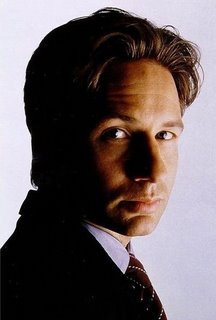 Plus, I'm saying it again, David Duchovny's acting was incredibly successful. Actually I was even a little bit sad when I saw on some entertainment video podcasts that he is now keeping aging and aging and almost lose his good-looking and "spooky" spirit of the impressive Special Agent he ever played.
Plus, I'm saying it again, David Duchovny's acting was incredibly successful. Actually I was even a little bit sad when I saw on some entertainment video podcasts that he is now keeping aging and aging and almost lose his good-looking and "spooky" spirit of the impressive Special Agent he ever played.List of All The X-Files' 201 episodes… -> I do recollect the detailed plot of each episode just on sight of each of those intro screenshots. Basically, I had been watching the X-Files DVD over and over throughout the year 1998-2003, it just shocked me at the very beginning and continued to amaze me again and again for the rest of those memorable years.
Monday, August 14, 2006
Another Wifi Troubleshooting
So here is the "knowledge" Microsoft is trying to "hide" from us (-:
This behavior (the situation described above) occurs for several reasons. Some computer and hardware manufacturers provide their own configuration software that replaces the Wireless Zero Configuration service that is provided in Windows. In that case, you must use the software that is provided by the manufacturer to configure your wireless network. If you want to use the Wireless Network Setup Wizard or the View Available Wireless Networks feature to configure your wireless device, see the documentation that came with your computer or with your wireless network card. Use this documentation to determine whether you can use the Wireless Zero Configuration service to configure your wireless network. Sometimes, you cannot use the Windows functionality.
If your computer or your wireless network adapter did not come with its own wireless network software, follow these steps:
1. Click Start, click Run, type ncpa.cpl, and then click OK.
2. Click Network Connections.
3. In Network Connections, click to select your wireless connection, and then click Change settings of this connection.
4. On the Wireless Networks tab, click to select the Use Windows to configure my wireless network settings check box.
To start the Wireless Zero Configuration service, follow these steps:
1. Click Start, click Run, type %SystemRoot%\system32\services.msc /s, and then click OK.
2. Double-click Wireless Zero Configuration.
3. In the Startup type list, click Automatic, and then click Apply.
4. In the Service status area, click Start, and then click OK.

After the Windows service is activated, the nearby wireless networks should now become detectable and the PC with the wireless network card should now be able to be properly connected.
If there are some basic security settings enabled on the wireless network, before you try to connect your PC, don't forget to add the MAC address of the card to the Access Point/wireless router's Access Control allowed list in its firmware, and tune down the encryption mode from "WPA(TKIP)/WPA2(AES)" to "WEP" or Mixed Mode if you are using an IEEE 802.11b rather than a g card which may not support the enhanced security protocol.
Sunday, August 13, 2006
Highly Anticipated RPG Masterpiece: Neverwinter Nights 2
 From Gamespot.com
From Gamespot.comWe take an exclusive look at this role-playing game sequel and discuss the story and character development with one of the finest RPG writers in the business.
The classic role-playing game puts you in the role of a would-be hero who must perform a bunch of quests, recover a bunch of treasures, gain a bunch of experience levels, and maybe fight a bunch of monsters, some of which may or not be skeletons. But the upcoming sequel Neverwinter Nights 2 from developer Obsidian Entertainment and publisher Atari will offer a very different experience, because the game will not only ship with a massive single-player game that will eventually make you one of the most important and powerful characters in the world, and also because it will ship with a robust toolset and everything you need to build and play your very own adventures online. Fortunately for us, Obsidian creative director Chris Avellone--whose writing and design credits include the flawed-but-still-enjoyable Knights of the Old Republic II, the post-apocalyptic RPG Fallout 2, and the cult-classic Planescape: Torment--gave us a guided tour of what this sequel has to offer. A warning for Torment fans: this preview contains a spoiler that may make you get all nostalgic and misty-eyed.
...
Neverwinter Nights 2 stands to become the same kind of successful, all-in-one RPG package that the original Neverwinter Nights was, just better--with more content, a more-powerful editor, and an even more-substantial campaign with bigger party sizes and much more-compelling character interaction. The sequel is scheduled for release in October.
Neverwinter Nights 2 Updated Impressions - Character Creation, High-Level Battles, Story, and Character Development ->
PREVIEW Posted: August 12, 2006 - 9:54 AM
Plus, a brief video preview from the August 2006 PC User magazine (Australia) provided by Pstarky on YouTube:
Saturday, August 12, 2006
Circuits: Getting Hung Up on the Apple-Microsoft War
 This week, Apple revealed some of the key new features in "Leopard," the 10.5 version of Mac OS X that's scheduled to ship in the spring. Apple and its most die-hard fans wasted no time in comparing it with Microsoft's own imminent new operating system, Windows Vista. One banner at Apple's Developers' Conference said, for example, "Hasta la vista, Vista." Another taunted: "Redmond has a cat, too--a copycat."
This week, Apple revealed some of the key new features in "Leopard," the 10.5 version of Mac OS X that's scheduled to ship in the spring. Apple and its most die-hard fans wasted no time in comparing it with Microsoft's own imminent new operating system, Windows Vista. One banner at Apple's Developers' Conference said, for example, "Hasta la vista, Vista." Another taunted: "Redmond has a cat, too--a copycat."Mac fans online are fond of pointing out that in the time it took Microsoft to release *one* new Windows version, Apple has released *five* new Mac OS X versions. (Of course, they're less vocal about the fact that they've dished out $650 to keep up with these updates.)
Apple and many observers also point out that Mac OS X is a *better* operating system than Windows. I'm among them, especially if we're talking about Windows XP. Mac OS X is far more logical in structure and more refined around the edges.
And it's certainly more secure. The Mac is essentially virus- and spyware-free--and no, not just because its market share is so small the virus writers don't bother with it. Mac OS X had security built in from the beginning, in ways that Microsoft didn't add until Windows Vista (like requiring your permission when a program tries to install itself).
What baffles me, though, is why people get so hung up on the Apple-Microsoft war. As far as I can tell, there *is* no real war.
See, I'm fairly resigned to Windows's dominance. If Microsoft changed nothing in Vista but the color scheme, Windows would still be the 90 percent market-share gorilla.
Why? Because the market-share figures includes sales of computers to corporations, which buy hundreds of PC's at a time. And the corporate world long ago standardized on Windows. It makes no difference how superior Mac OS X or Linux may be; the world's I.T. staffs will switch their entire companies away from Windows the day Rush Limbaugh votes for Hillary Clinton.
After all, the I.T. people know where their bread is buttered. If Macs are indeed less trouble-prone and complex than Windows PC's, they're doomed in corporations; the last thing the I.T. guys want to do is obsolete themselves.
The only legitimate fight, therefore, is for the souls of individuals and small business owners who actually have a choice of platform--people whose computer choice is dictated by their corporate employers. But these are just market-share scraps.
Apple does seem to be winning the scraps, by the way; Macs have actually picked up a couple of points of market share recently.
But big companies will always buy Windows. In my view, the die was actually cast the day I.B.M., supplier to corporate America, chose Microsoft decades ago. And when you accept that fact, this business about an Apple-vs.-Microsoft feud for dominance looks purely symbolic.
Maybe it would be best to keep this observation secret, though. The fantasy that the marketplace is actually up for grabs does do two good things: It drives Microsoft to improve Windows, and drives Apple to continue dreaming up new directions for the desktop operating system.
(For example, I had my doubts that Apple could come up with anything in Mac OS X 10.5 with as great an impact as the Spotlight instant-search feature did in 10.4.
But Leopard will include an automatic, invisible, whole-computer backup system called Time Machine. In times of hard-drive failure or human error, it will let you rewind either your operating system or even individual documents and windows to earlier versions. Remember, fewer than five percent of us have automatic backup systems in place, so this is huge. Yes, I know there are certain third-party software programs that do something like this--there always are. But it's quite another matter when it becomes part of the operating system.)
Followers of both camps, in other words, can save themselves a lot of ulcers if they just acknowledge a few facts:
* Microsoft gets a lot of ideas from Apple; Apple also gets ideas from Microsoft. It doesn't matter; the most expensive lawyers in Silicon Valley have established that it's all perfectly legal.
* Microsoft has won the market-share war, because it dominates in corporations.
* Both companies are profitable and have very long futures ahead of them.
* If market share were measured by individual buying decisions (rather than quantity of computers), Apple's rank would be much higher.
* Even if the grand prize for the "war" is individuals, families and small businesses, the perception of a much bigger war is useful; Windows Vista and Mac OS X Leopard may in fact be on completely different playing fields, but they're both looking like the best versions ever.

Friday, August 11, 2006
Selective Apple Commercials
iPod Shuffle Ad (Jerk It Out)
Tekserve Dominos Commercial (Extended)
iPod Retail Demo Loop
Think Different
Apple 'HAL9000' Ad
iMac G4 Window Ad
Get A Mac Ad: Restarting
Get A Mac Ad: Touché
Big & Small Powerbook Ad
Not ads, but an interesting "historic event": The First Ever iPod Introduction - Apple Music Event 2001
More on MacTV Video PodCast ->
Thursday, August 10, 2006
WGA: You Are Busted! Or No?
I do have genuine copies of Windows, which of course, come together with the laptop I bought in none-English spoken counties and the unique product keys printed on the COA label affixed to the PC chassis, however, the international versions of OS in many cases just won’t work very properly under a holistic English software environment.
But just like the diagnostic tool even cannot catch those deliberate cheaters who simply Google for invalid CD product-keys that may have been there for years just to test how WGA would response (that is, the checking result by WGA on these obviously illegal Windows copies may be very likely that they are 100% genuine, safely letting them through the validation steps of those installation procedures which require Genuine Windows installed first, such as IE7 Beta, Windows Defender and Windows Media Player 11.), it seems that it can neither exert any essential influence on my Windows PC. I don't know why but as a diagnosed and apparent privacy victim I can still have the critical and cumulative updates for Windows, IE6, etc. automatically and successfully installed, most recently are the patches for 23 vulnerabilities Microsoft released this week. And for important Office 2003 Updates, which under my impression for many years were absolutely correlated with the genuineness of the Windows where it's installed as well, they are also running so smoothly without interruption to notify me familiar messages. My Outlook 2003 equipped with the latest algorithm for calculating junk email can filter spam just as accurately as Rogers Yahoo! Mail's Spam Protection does so it has been a long time since the last time I checked my Bulk folder for miscategorised messages.

So what the point of the crappy WGA and all those related anti-privacy products? Are they to seize those "law-abiding" citizens who have completely out-from-factory copies of Windows installed and demand more ransom from them, or to indulge the lucky outlaws by offering them all the benefits that only "club members" could enjoy, or to even just perfunctorily warn the miserable prisoners about their marked standings but actually totally ignore them as if they had been successfully bribing the officers into transferring them to the golden club area???
Tuesday, August 08, 2006
Apple WWDC 2006

Apple CEO Steve Jobs delivers the keynote address at the 2006 Apple Worldwide Developer's Conference in San Francisco, California. Jobs kicked off the annual conference with announcements of a new Mac Pro desktop computer featuring Intel processors and Mac OSX Leopard operating system that is due to launch in the spring of 2007.(AFP/Getty Images/Justin Sullivan)
As always, just fun to watch:
http://www.apple.com/quicktime/qtv/wwdc06/
(about 90 minutes. on the Leopard part, I like the Spaces, the Core Animation, iChat theatre, the improved Mail as well maybe, and especially, the "drag and make" Widgets. Not much on the Time Machine, 'cause lots of software packages can play the some trick, and just like the notorious "system restore" feature in Windows, if not turned off, it should occupy large amount of dedicated hard drive space just for backups - "the important yet always the secondary task in the digital world", and may seriously invade one's privacy should the physical machine get lost or stolen due to its easy usability. It only works well when it takes good advantage of the development of media storage technology and gets carefully monitored.)
Monday, August 07, 2006
eBay Frenzy
PC2100 512MB SODIMM APPLE iBOOK, DELL, SONY, HP, IBM, TOSHIBA

Kensington Bluetooth USB Adapter Dongle LG VX5200 CE500

EXTERNAL 200GB SLIM USB 2.0 MOBILE HARD DRIVE 7200RPM

USB to PS2 PS/2 Adapter Converter For Keyboard Mouse

WIRELESS INTERNET NOTEBOOK CARD PC ADAPTER NEW LINKSYS

Friday, August 04, 2006
Adobe Audition 2.0
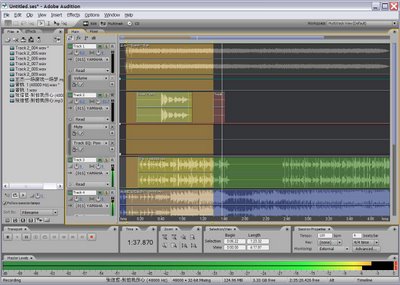 Finally and excitingly, my "Swiss army knife" audio studio has been updated to its latest version. Its advanced functionalities should meet more multi-media editing needs and provide more professional effects.
Finally and excitingly, my "Swiss army knife" audio studio has been updated to its latest version. Its advanced functionalities should meet more multi-media editing needs and provide more professional effects.Record, mix, edit, and master digital audio files with powerful tools that bring flexibility and control to your desktop studio. Easily create music, produce radio spots, and restore imperfect recordings. Bring audio and video together using smart integration with Adobe video applications. Get professional results in real time with Adobe® Audition® 2.0 software.
Thursday, August 03, 2006
Jianghu Laughter
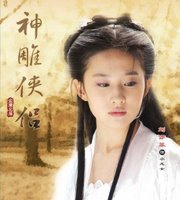 《江湖笑》
《江湖笑》央视神雕侠侣片尾曲
词/曲:小虫
原唱:周华健
专辑:雨人
江湖笑 恩怨了 人过招 笑藏刀
红尘笑 笑寂寥 心太高 到不了
明月照 路迢迢 人会老 心不老
爱不到 放不掉 忘不了 你的好
看似花非花 雾非雾
滔滔江水留不住
一身豪情壮志 铁傲骨
原来英雄是孤独
江湖笑 爱逍遥 琴或萧 酒来倒
仰天笑 全忘了 潇洒如风 轻飘飘
江湖笑 爱逍遥 爱或恨 都不要
仰天笑 全忘了 潇洒如风 轻飘飘
